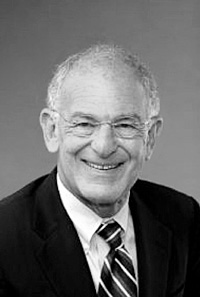
Cantor Stephen Richards
First GTM President
1972
At the ACC convention in Toronto, Cantor Stephen Richards, then a Board Member of the ACC, was assigned the task of meeting with composers and music directors of Synagogue music to see what support the ACC could provide to them and to their cantors. Several noted musicians contributed to the discussion including Lazar Weiner, Herman Berlinsky, and Michael Isaacson. At that meeting, it was decided to contact all the large UAHC congregations (those with over 350 families) that did not have cantors to find out who was in charge of their music.
Cantor Richards, with the help of the secretarial services of his synagogue (Indianapolis Hebrew Congregation), sent out numerous letters and received an overwhelming response. With those first interested musicians, the Guild was born and Cantor Richards became its first President.
1972
At the ACC convention in Toronto, Cantor Stephen Richards, then a Board Member of the ACC, was assigned the task of meeting with composers and music directors of Synagogue music to see what support the ACC could provide to them and to their cantors. Several noted musicians contributed to the discussion including Lazar Weiner, Herman Berlinsky, and Michael Isaacson. At that meeting, it was decided to contact all the large UAHC congregations (those with over 350 families) that did not have cantors to find out who was in charge of their music.
Cantor Richards, with the help of the secretarial services of his synagogue (Indianapolis Hebrew Congregation), sent out numerous letters and received an overwhelming response. With those first interested musicians, the Guild was born and Cantor Richards became its first President.

Cantor Stephen Richards
First GTM President
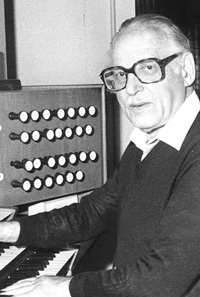
Herman Berlinski
Famed Composer and Organist
1974
А meeting was held in Cincinnati to further discuss the issues of how to assist musicians who support cantors and their music programs. At this time in the Reform movement, the template for worship still followed the Classic Reform ideal of organ and choir. The idea of a cantor in Reform synagogues was still fairly new, slowly gaining credence, interest, and acceptance. Lacking an ability to form or afford a professional choir, synagogue music was often supported or led entirely by well-meaning, generous talents within the geographic area –Jew, non-Jew, guitarist, pianist – whoever was available. These people had little training in Jewish music, history, liturgy, or music tradition. It was determined that the Guild should reach out and provide education in these areas for such people, while also encouraging synagogue use of trained, invested Cantors to help lead in worship.
That year, the famed composer and organist Herman Berlinski was elected as President. At that time, because it was deemed essential to bring trained cantors into acceptance and into the pulpit within the Reform Movement, it was determined that the Guild would be open only to accompanists, conductors, and support musicians, not singers. After several years, once it was learned that soloists were often the sole source of music and greatly in need of contact with their fellow musicians, the membership opened up to them as well with the hope that they would choose to enter the cantorate at a later date.

Herman Berlinski
Famed Composer and Organist
1974
А meeting was held in Cincinnati to further discuss the issues of how to assist musicians who support cantors and their music programs. At this time in the Reform movement, the template for worship still followed the Classic Reform ideal of organ and choir. The idea of a cantor in Reform synagogues was still fairly new, slowly gaining credence, interest, and acceptance. Lacking an ability to form or afford a professional choir, synagogue music was often supported or led entirely by well-meaning, generous talents within the geographic area –Jew, non-Jew, guitarist, pianist – whoever was available. These people had little training in Jewish music, history, liturgy, or music tradition. It was determined that the Guild should reach out and provide education in these areas for such people, while also encouraging synagogue use of trained, invested Cantors to help lead in worship.
That year, the famed composer and organist Herman Berlinski was elected as President. At that time, because it was deemed essential to bring trained cantors into acceptance and into the pulpit within the Reform Movement, it was determined that the Guild would be open only to accompanists, conductors, and support musicians, not singers. After several years, once it was learned that soloists were often the sole source of music and greatly in need of contact with their fellow musicians, the membership opened up to them as well with the hope that they would choose to enter the cantorate at a later date.
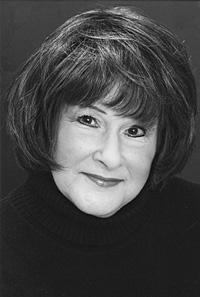
Judith Karzen
GTM President For 11 Years
1975
Judith Karzen, Director of Music at Temple Beth Israel in Chicago for 35 years—from 1962-1997 and Director of the Halevi Choral Society from 1984-2009, became President and led the organization for 11 years. During that time, many illustrious musicians in the field offered their hard work and talent including Sonia Kass, who served for many years as Treasurer, Wally Zimmerman, who did the work of designing the by-laws, Christine Crockett, Myrna Braverman, Ben Steinberg, and Stephen Richards.
A newsletter was created, informing people of the Guild’s activities but also presenting articles on various areas of Jewish teaching and music used within them movement: What is nusach? What is trope? What is Jewish Music? The history? In later years, the newsletter was taken over by Henry and Jill Higgins, renamed “Klei Shir,” and continued to present articles of note, plus news of programs presented by its membership.
The Guild presented many workshops on the music of composers like Helfman, Shalit, Chajes, Ephros and others. They presented concerts of their music and other interesting works for the Conventions. Along the way they continued to work closely with the ACC and eventually joined with the ACC in co-sponsoring the annual conventions. Cantors Paul Silbersher and Richard Botton were instrumental in promoting the GTM and enabling the organization to gain the respect they felt was due to the organization and its membership for their accomplishments as musicians and for a sincere caring about the tradition.
1975
Judith Karzen, Director of Music at Temple Beth Israel in Chicago for 35 years—from 1962-1997 and Director of the Halevi Choral Society from 1984-2009, became President and led the organization for 11 years. During that time, many illustrious musicians in the field offered their hard work and talent including Sonia Kass, who served for many years as Treasurer, Wally Zimmerman, who did the work of designing the by-laws, Christine Crockett, Myrna Braverman, Ben Steinberg, and Stephen Richards.
A newsletter was created, informing people of the Guild’s activities but also presenting articles on various areas of Jewish teaching and music used within them movement: What is nusach? What is trope? What is Jewish Music? The history? In later years, the newsletter was taken over by Henry and Jill Higgins, renamed “Klei Shir,” and continued to present articles of note, plus news of programs presented by its membership.
The Guild presented many workshops on the music of composers like Helfman, Shalit, Chajes, Ephros and others. They presented concerts of their music and other interesting works for the Conventions. Along the way they continued to work closely with the ACC and eventually joined with the ACC in co-sponsoring the annual conventions. Cantors Paul Silbersher and Richard Botton were instrumental in promoting the GTM and enabling the organization to gain the respect they felt was due to the organization and its membership for their accomplishments as musicians and for a sincere caring about the tradition.

Judith Karzen
GTM President For 11 Years
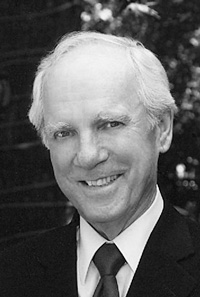
Dr. Ben Steinberg
Founder of the YCA Award
1990
Ben Steinberg, in an effort to replenish the numbers of aging composers of serious Jewish Music at the time, as well as emphasize the importance of traditional, adult music in worship services, created “The GTM Young Composer’s Award.” The project, which encouraged young Jewish composers to produce fully realized solo and choral works for the synagogue and bring a new generation of classically trained creative musicians into the field of Jewish music, has produced many beautiful works from gifted young composers and attracted a number of these composers to become active contributors to synagogue music.
The Award continues to grow in stature and currently offers a $2,500 prize to the winner and the opportunity to premiere his/her new work at the ACC/GTM Convention during the year of their win. Dr. Steinberg was head juror and administrator of the YCA for its first 20 years, until 2010 when he handed over the reins to David Shukiar, a two time winner of the Award.

Dr. Ben Steinberg
Founder of the YCA Award
1990
Ben Steinberg, in an effort to replenish the numbers of aging composers of serious Jewish Music at the time, as well as emphasize the importance of traditional, adult music in worship services, created “The GTM Young Composer’s Award.” The project, which encouraged young Jewish composers to produce fully realized solo and choral works for the synagogue and bring a new generation of classically trained creative musicians into the field of Jewish music, has produced many beautiful works from gifted young composers and attracted a number of these composers to become active contributors to synagogue music.
The Award continues to grow in stature and currently offers a $2,500 prize to the winner and the opportunity to premiere his/her new work at the ACC/GTM Convention during the year of their win. Dr. Steinberg was head juror and administrator of the YCA for its first 20 years, until 2010 when he handed over the reins to David Shukiar, a two time winner of the Award.
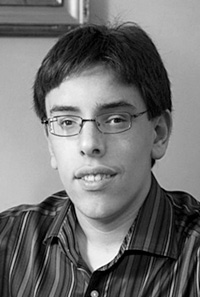
Jeremiah Klarman
First Winner of “Generation to Generation Prize”
2010
The Guild, along with the ACC and the Joint Commission on Worship, Music and Religious Living of the Union for Reform Judaism, created the “Generation to Generation Prize.” This prize is awarded to a talented high school student who demonstrates promise in creating melodies that show sensitivity to the setting of Jewish liturgical texts.
The winner is then paired with an experienced composer of Jewish liturgical music to refine and expand his/her understanding of the piece. The Prize’s first winner was Jerimiah Klarman for his setting of “R’tzei,” and Cantor Richards was acting mentor.
2010
The Guild, along with the ACC and the Joint Commission on Worship, Music and Religious Living of the Union for Reform Judaism, created the “Generation to Generation Prize.” This prize is awarded to a talented high school student who demonstrates promise in creating melodies that show sensitivity to the setting of Jewish liturgical texts.
The winner is then paired with an experienced composer of Jewish liturgical music to refine and expand his/her understanding of the piece. The Prize’s first winner was Jerimiah Klarman for his setting of “R’tzei,” and Cantor Richards was acting mentor.

Jeremiah Klarman
First Winner of “Generation to Generation Prize”
TODAY
The Guild endeavors to continue the work begun by its illustrious founders. Along with the Convention, the Guild also supports regional gatherings to enhance education and camaraderie between its members.
The Guild now communicates via email, digital newsletters and our website, offering the education and specialization that will continue to encourage and help its members to grow in knowledge and musicianship. The Guild welcomes members at all stages of musical development and with all tastes for, and styles of, Jewish music. The Guild maintains its dedication towards excellence in educating its membership and their congregations, and to bringing in new members who will take the knowledge and music of the tradition back to their congregations, promoting further education and growth.
TODAY
The Guild endeavors to continue the work begun by its illustrious founders. Along with the Convention, the Guild also supports regional gatherings to enhance education and camaraderie between its members.
The Guild now communicates via email, digital newsletters and our website, offering the education and specialization that will continue to encourage and help its members to grow in knowledge and musicianship. The Guild welcomes members at all stages of musical development and with all tastes for, and styles of, Jewish music. The Guild maintains its dedication towards excellence in educating its membership and their congregations, and to bringing in new members who will take the knowledge and music of the tradition back to their congregations, promoting further education and growth.



